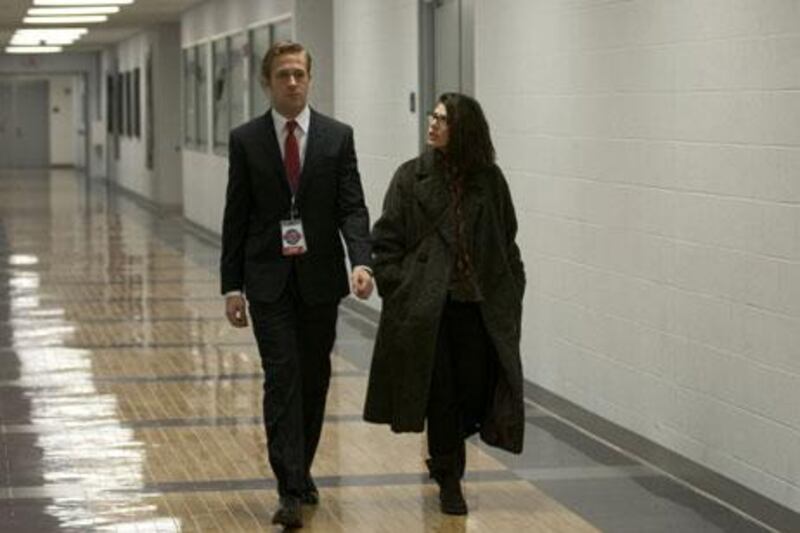"Mike Morris is a politician … he will let you down, sooner or later." The words of Marisa Tomei's jaded reporter – directed at an idealistic junior campaign manager played by Ryan Gosling in The Ides of March – have a particular resonance three years into the presidency of Barack Obama.
Elected on a tidal wave of hope and optimism, the US president's approval rating now languishes at around 40 per cent, with many who supported his campaign in 2008 feeling increasingly let down by a series of compromises. In the film, the face of the White House hopeful Governor Mike Morris (George Clooney) even appears on a version of the Obama campaign's iconic "Hope" poster.
According to Entertainment Weekly, the Hollywood star, who directed and co-wrote the movie, met the president during a recent fund-raising event in Los Angeles. When Obama asked Clooney what he had been working on, the actor said he was wrapping up production on the film, set during a crucial Democratic primary in Ohio – something all too familiar to the president.
"Should we screen it?" Clooney recalled the president asking.
"Absolutely not!" the actor responded.
In the drama, Governor Morris appears to be a deeply principled man, committed to reducing the US's dependence on foreign oil to safeguard the environment and national security, as well as enacting a raft of progressive social policies. Most importantly, he aims to win the election without making deals with political rivals or private interest groups that could compromise his vision, once elected. But as Tomei's character predicts, the presidential hopeful's firm moral stance is slowly eroded by a combination of his own wrongdoing and the cut-throat political process in which he finds himself. The very man whom Gosling's character believes to be the only one who can "make a real difference in people's lives" and admits to "drinking the Kool-Aid" for, quickly becomes a failed president in waiting.
There's little surprise, then, that Clooney (an active Democratic supporter) was so keen to shelter the embattled president and his associates from such a story.
"This film is a fairly cynical look at politics and [three years ago] it wasn't a very cynical time in our country. I think the hope has been tamped down a bit since then," Clooney told the entertainment website The Vine. "But, it's all cyclical and it will change back again, so I do feel optimistic."
The actor may claim to be still holding on to hope, but there's little evidence of it in his film. Political cynicism in movies is hardly new, however. In fact, it's practically Hollywood's default position.
With the exception of a handful of exalted statesmen (Abraham Lincoln, Winston Churchill and John F Kennedy), on-screen politicians tend to be depicted as either corrupt, incompetent or both. Perhaps Hollywood's most famous political drama is Mr Smith Goes to Washington. The 1939 movie sees an everyday American, Jefferson Smith (James Stewart), appointed to fill a vacancy in the US senate, only to come up against endemic corruption. When the idealistic Mr Smith attempts to confront the wrongdoers, he becomes the target of a vicious smear campaign. The film was so critical of US politics, it was attacked upon release as un-American and pro-communist.
Like The Ides of March, many political dramas have targeted perceived flaws in the US election process. Robert Redford's turn in The Candidate in 1972 suggested how easily a no-hoper could be made to appear credible with the support of powerful, interested parties. The 2004 remake of The Manchurian Candidate even saw a vice-president elected who had been brainwashed by a weapons manufacturing company.
Rarely are politicians shown to be so incompetent as when waging war, however. From the US president Merkin Muffley's (Peter Sellers) bungled response to a nuclear alert in Dr Strangelove, to the manipulation of evidence in the lead up to the invasion of Iraq shown in the British comedy In the Loop, the politics of warfare is almost as funny as it is terrifying.
Perhaps the closest political drama to reality is 1998's Primary Colours, starring John Travolta as Jack Stanton – a candidate closely modelled on Bill Clinton. Based on the book of the same name (originally published anonymously, but later revealed to have been written by the political journalist Joe Klein), it details revelations of a sex scandal during Clinton's first presidential campaign in 1992. Although based on previous alleged infidelities, the film was released in 1998, when the world was gripped by the Monica Lewinski scandal.
With no shortage of political wrongdoings exposed in the early years of the 21st century, The Ides of March stands as evidence that political dramas aren't about to become less cynical any time soon.
Ÿ The Ides of March is currently showing in UAE cinemas





